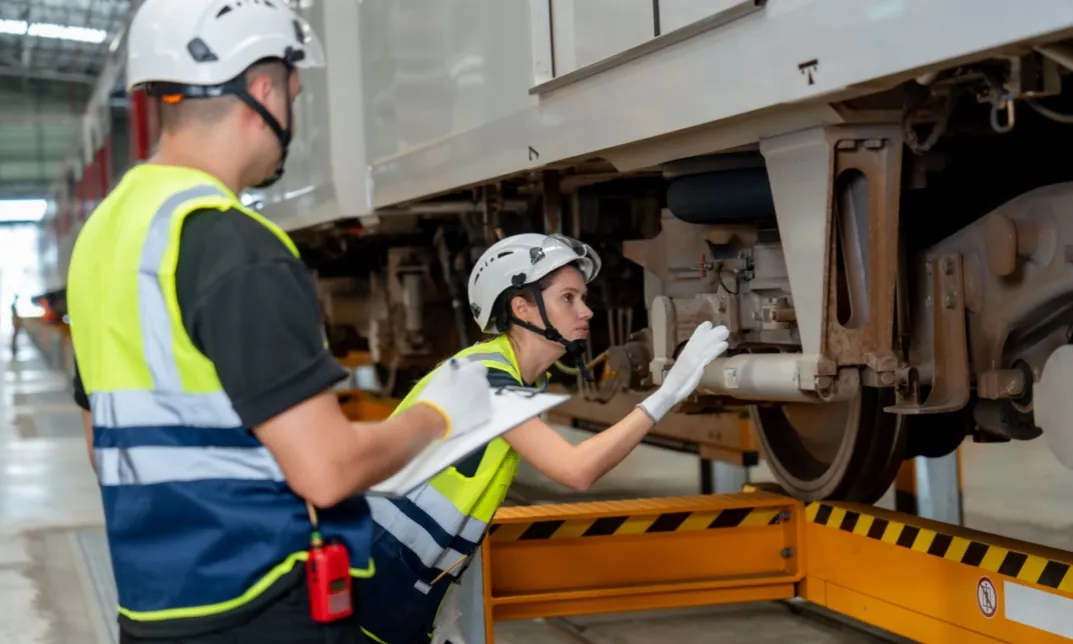No products in the cart.
Millions of people travel by rail every day throughout the UK, and for many, it is an integral part of their daily lives. In order to bring passengers to their destination quickly and safely, train drivers are essential. Are you interested in becoming a train driver but not sure where to get started? Here, we are here to give you a precise guide on how to become a train driver. It sounds interesting, right? In this blog, we explain the journey of becoming a train driver in the UK. In this guide, we’ll walk you through the steps to becoming a train driver in the UK.

How to become a train driver?
Becoming a train driver in the UK is a dream job for many. If you’re considering this career path, here’s a step-by-step guide to help you navigate the process.
Research the Role
Before diving into the application process, it’s crucial to understand what being a train driver holds. Train drivers operate trains, ensuring the safety and comfort of passengers or cargo. The job requires excellent concentration, quick decision-making, and adherence to strict safety protocols.
Meet the Basic Requirements
To become a train driver, you must meet certain basic criteria:
- Age: You need to be at least 21 years old.
- Education: There are no specific educational requirements, but basic literacy and numeracy skills are essential.
- Health: Good physical and mental health is crucial. You’ll undergo a medical examination to check your vision, hearing, and overall health.
Develop Relevant Skills and Experience
While specific qualifications may not be required, having certain skills and experiences can boost your chances:
- Driving Experience: Experience with any form of driving can be beneficial.
- Technical Skills: Familiarity with mechanical and electrical systems is a plus.
- Customer Service: Experience in customer service can be advantageous, especially for passenger train drivers.
Apply for a Train Driver Position
Most train operating companies (TOCs) and freight operating companies (FOCs) in the UK recruit train drivers. Here are some key steps:
- Job Search: Check the careers sections of TOC and FOC websites, and job search portals like Indeed or LinkedIn for train driver vacancies.
- Application: Complete the application form with accurate and detailed information about your qualifications and experience.
Pass the Selection Process
If your application is shortlisted, you’ll go through a rigorous selection process, which typically includes:
- Psychometric Tests: These assess your cognitive abilities, concentration, and reaction times.
- Interviews: You’ll have interviews to evaluate your suitability for the role, including your understanding of the responsibilities and your motivation for becoming a train driver.
- Assessment Centres: These might include group exercises, practical tasks, and further psychometric testing.
Complete the Training programme
Successful candidates will undergo a comprehensive training programme, usually lasting 12-18 months, which includes:
- Classroom Training: Learning the theoretical aspects of train driving, including safety procedures, route knowledge, and regulations.
- Simulator Training: Practising driving trains in a controlled, virtual environment.
- On-the-Job Training: Gaining practical experience under the supervision of a qualified train driver.
Obtain the Necessary Certifications
During your training, you’ll need to obtain several certifications, including:
- Train Driving Licence: Issued by the Office of Rail and Road (ORR), this licence is mandatory for all train drivers in the UK.
- Route Knowledge: Certification proving you know the routes you’ll be driving on.
- Online Certification: You can visit Wise Campus and enrol in our Rail Training course to better understand this sector, as it is one of the best courses in the UK. Moreover, our courses are CPD certified in the UK.
Start Your Career
Once you’ve completed your training and obtained the necessary certifications, you can start working as a qualified train driver. Continue to develop your skills and knowledge, as ongoing training and assessments are part of maintaining your qualifications and ensuring safety.
What are the responsibilities of a train driver?
Becoming a train driver in the UK is a rewarding career with a number of responsibilities. Generally, a train driver’s primary duty is to ensure the safe and efficient operation of the train. Plus, They have to transport passengers and goods across the rail network. Here are the key responsibilities of a train driver:

Safe Operation of Trains
A train drivers must operate trains safely, concern about speed limits, signals, and regulations to prevent accidents. They are responsible for the well-being of passengers, crew, and cargo.
Pre-Departure Checks
Before each journey, train drivers conduct thorough checks of the train’s systems and equipment. This includes testing brakes, communication systems, and ensuring all doors and safety mechanisms are functioning correctly.
Monitoring Controls and Instruments
Throughout the journey, train drivers continuously monitor controls, instruments, and gauges to ensure the train is operating within safe parameters. They must be vigilant to any changes or anomalies.
Perfect Punctuality
Train drivers must adhere to strict schedules, ensuring that trains run on time while maintaining safety standards. This requires efficient time management and quick decision-making, especially in unexpected situations.
Managing Unexpected Situations
In case of emergencies, such as mechanical failures or obstructions on the track, train drivers must respond quickly and effectively. This includes safely stopping the train, communicating with control centres, and managing passenger safety.
Maintaining Knowledge of Routes and Regulations
Train drivers need to have a knowledge of the routes they operate, including signal locations, speed limits, and any specific route hazards. They must also stay updated with the latest railway regulations and safety procedures.
Customer Service
While their primary role is to operate the train, drivers also play a part in customer service. They may need to make announcements, provide information, and assist with passenger inquiries, ensuring a pleasant journey experience.
Ongoing Training and Development
Continuous professional development is part of the job. Train drivers must regularly undergo training to stay proficient in new technologies, safety protocols, and changes in regulations. This commitment to learning ensures they maintain high standards of operation.
By fulfilling these responsibilities, train drivers play a crucial role in the UK’s railway network, contributing to the safety, efficiency, and reliability of train services across the country.
How many hours do they work?
Train drivers in the UK typically work an average of 35-40 hours a week. However, it’s important to remember this is an average and can vary depending on factors like:
- Employer: Different train companies may have slightly different working hour expectations.
- Role: Passenger train drivers tend to work more predictable schedules than freight train drivers, who often have nights and weekends.
- Specialisations: Some specialisations within train driving may require additional hours.
Shift work is a big part of being a train driver. Shifts, also called turns, can range from around 6 to 11 hours. To accommodate the public transportation needs, these shifts can include early mornings, evenings, weekends, and even bank holidays.
How much do train drivers earn?
Train drivers in the UK can expect a competitive salary, with earnings varying depending on experience, location, and the company they work for. Here’s a breakdown to give you an idea:
- Average Salary: Ranges from £44,418 for freight train drivers to £48,500 for passenger train drivers.
- Starting Salary: Typically around £24,000 to £30,000 Reed.
- Experienced Driver: Salaries can exceed £65,000, particularly for long-distance routes and with overtime Cashfloat.
Additional Factors Affecting Salary:
- Company: Different train companies may offer varying salary structures and benefit packages.
- Location: London Underground drivers tend to earn on the higher end, Reed.
- Overtime: Working overtime, especially on Sundays, can significantly boost your income.






